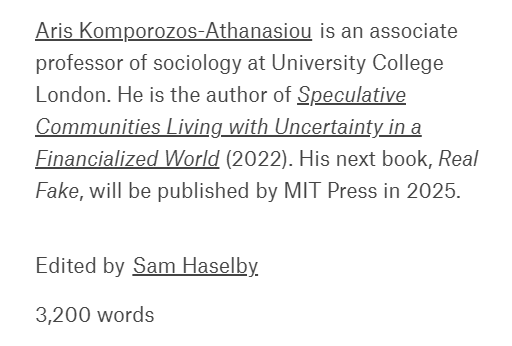Welcome to DU!
The truly grassroots left-of-center political community where regular people, not algorithms, drive the discussions and set the standards.
Join the community:
Create a free account
Support DU (and get rid of ads!):
Become a Star Member
Latest Breaking News
General Discussion
The DU Lounge
All Forums
Issue Forums
Culture Forums
Alliance Forums
Region Forums
Support Forums
Help & Search
Finance as alchemy

Finance fraud is not a deviation from an essentially rational system but a window onto the reality-distortion of markets
https://aeon.co/essays/finance-fraud-is-not-a-deviation-from-the-norm-but-a-reflection-of-it


When the German banking giant Wirecard collapsed in June 2020 amid a roaring fraud scandal, public opinion was shocked. The company, praised as the country’s innovative answer to the fintech industry of Silicon Valley, had been widely seen as a ‘German miracle’ following recovery from the 2008 financial crisis. Its bankruptcy involved a massive state prosecution that sent shockwaves through world markets. To the astonishment of German and international observers, Wirecard executives were found to be involved in all manner of deception: direct falsification of accounts, fake cash-flows, re-routing of payments through non-existing shell companies, ghost subsidiaries. While forging profits, they had obscured a mammoth debt of €3.5 billion.
This, of course, is not an unfamiliar tale. The explosive growth of finance as a percentage of the ‘real’ economy in recent decades has been matched by an equally dazzling scale of financial fraud, from the Enron scandal to Bernie Madoff’s pyramid scheme (the largest recorded fraud in world history) in the 2000s, to more recent scams in cryptocurrency markets such as FTX. Denizens of finance – both system insiders (Madoff was a former chairman of the Nasdaq exchange) and ‘maverick’ outsiders (Sam Bankman-Fried of FTX had been seen as a challenger of mainstream banking elites) – have displayed a unique capacity for alchemy: whipping up distorted realities in which false truth and true fact become indistinguishable. Their plotting is often aided by regulatory bodies, rating agencies and consultancies that firm up such distorted realities through either action or inaction.
A recent Netflix documentary follows the Financial Times reporter Dan McCrum in his quest to reveal Wirecard’s own big con. The ‘aha’ moment comes when McCrum and his FT colleagues show up at the Singapore address of one of the company’s supposed subsidiaries only to find an unassuming farmhouse. Behind Wirecard’s opaque structure lay simply nothing: no accounts, no offices, no cash. Much of the bank’s alleged business had been conjured out of thin air. Evocatively subtitled ‘a fight for the truth’, McCrum’s bestselling book Money Men (2022), on which the Netflix show is based, offers an animated account not only of Wirecard’s fraudsters, but also of their victims – those led to believe the company bosses and their outlandish myths of stratospheric growth, despite ominous clouds of deceit hovering over. What made a fake story so readily believable by so many? How is it possible that a DAX 30-listed bank (with the backing of Germany’s former chancellor, Angela Merkel, herself) transpired to be a giant Ponzi scheme?

Today’s financial fraud is part of a bigger story unravelling outside of trading floors and corporate board rooms: a growing preoccupation over the nature of reality itself. On one level this preoccupation is fuelled by Big Tech, which has been pumping financial value through innovations ostensibly geared towards tackling ‘existential’ future threats via the production of simulated realities. Facebook’s launch of the Metaverse, an avatar world promising to revolutionise work and everyday life, has been critiqued as a fluke that aimed to distract from the company’s legal troubles, and the more recent release of programs such as ChatGPT and DALL-E by OpenAI intensified concerns about the use of artificial intelligence in Silicon Valley to address fabricated, rather than real, problems. While some artists, teachers and writers grew uneasy about the increasing ‘realness’ of such AI outputs, others see new opportunities in implementing these chatbots into their work and daily tasks – even though OpenAI has admitted that its ‘large language model’ suffers from so-called hallucination problems: a propensity to cheat by weaving fictitious facts into its answers to user prompts.
snip
InfoView thread info, including edit history
TrashPut this thread in your Trash Can (My DU » Trash Can)
BookmarkAdd this thread to your Bookmarks (My DU » Bookmarks)
0 replies, 580 views
ShareGet links to this post and/or share on social media
AlertAlert this post for a rule violation
PowersThere are no powers you can use on this post
EditCannot edit other people's posts
ReplyReply to this post
EditCannot edit other people's posts
Rec (1)
ReplyReply to this post